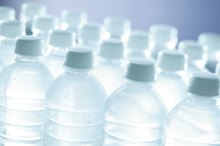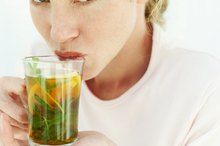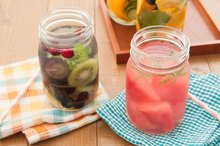What does fact checked mean?
At Healthfully, we strive to deliver objective content that is accurate and up-to-date. Our team periodically reviews articles in order to ensure content quality. The sources cited below consist of evidence from peer-reviewed journals, prominent medical organizations, academic associations, and government data.
- Centers for Disease Control and Prevention: Water: Meeting Your Daily Fluid Needs
- MedlinePlus: Vitamin C
- MedlinePlus: Antioxidants
- U.S. Food and Drug Administration: FDA Regulates the Safety of Bottled Water Beverages
- Academy of Nutrition and Dietetics: Position of the Academy of Nutrition and Dietetics: Use of Nutritive and Nonnutritive Sweeteners
- Academy of Nutrition and Dietetics: Position of the Academy of Nutrition and Dietetics: Use of Nutritive and Nonnutritive Sweeteners
The information contained on this site is for informational purposes only, and should not be used as a substitute for the advice of a professional health care provider. Please check with the appropriate physician regarding health questions and concerns. Although we strive to deliver accurate and up-to-date information, no guarantee to that effect is made.
Healthy Ways to Flavor Water for Bodybuilding
Water is critical to life and survival, making up 60 percent of your body. If you lose too much water or don't drink enough, you can become dehydrated and your electrolytes can become imbalanced. Under normal circumstances, you probably drink enough fluids to meet your daily needs. But participating in vigorous activities such as bodybuilding increases your daily needs because you're losing so much water. If you find drinking water monotonous, you can add flavor without packing on excessive calories.
Citrus-Flavored Water
Citrus fruits, including oranges, lemons and limes, are great to add to water. Not only does citrus lend water a refreshing taste, but it also supplies vitamin C with very few added calories. Vitamin C helps to heal wounds and create scar tissue. Try adding citrus slices to your water or squeeze the fruit to release more juice for a stronger taste. Water bottles or cups with infusers are an easy and convenient way to add fruit to your water.
- Citrus fruits, including oranges, lemons and limes, are great to add to water.
- Water bottles or cups with infusers are an easy and convenient way to add fruit to your water.
Berry-Flavored Water
Nutrition Facts of Dasani Water
Learn More
Fresh berries such as blueberries, strawberries, raspberries and blackberries add flavor along with essential vitamins and antioxidants with minimal calories 3. Consuming a diet rich in antioxidants can help lower your risk of some diseases 3. There is no need to crush the berries before adding them to the water. The longer you allow fresh berries to soak in the water, the more flavorful the taste will be. You may even consider mixing fresh berries with citrus fruit for a unique flavor.
- Fresh berries such as blueberries, strawberries, raspberries and blackberries add flavor along with essential vitamins and antioxidants with minimal calories 3.
- There is no need to crush the berries before adding them to the water.
Vegetable- and Herb-Flavored Water
Adding cucumbers to water provides a crisp taste. Herbal teas are available in numerous flavors and can also be used to flavor water. Most herbal teas contain minimal calories as long as you don't sugar. Consider using mint in your water for an energizing and invigorating taste. You can also mix mint with different flavors such as lemons or fresh berries for additional taste.
- Adding cucumbers to water provides a crisp taste.
- Herbal teas are available in numerous flavors and can also be used to flavor water.
Sugar-Free and Nonnutritive Sweeteners
What Should I Drink If I Hate Water?
Learn More
Sugar-free flavorings and non-nutritive sweeteners are available in numerous flavors and in powder or liquid form. Most sugar-free flavorings contain a sugar substitute, making them calorie-free, and some have added caffeine or vitamins and minerals. The Academy of Nutrition and Dietetics and the American Diabetes Association consider "non-nutritive sweeteners to be safe when consumed within the daily intake levels established by the U.S. Food and Drug Administration. 5"
- Sugar-free flavorings and non-nutritive sweeteners are available in numerous flavors and in powder or liquid form.
- Most sugar-free flavorings contain a sugar substitute, making them calorie-free, and some have added caffeine or vitamins and minerals.
Related Articles
References
Writer Bio
Rebecca Slayton is a Registered Dietitian and has worked in the nutrition field since 2006. Slayton received the 2005 Betty Feezor Scholarship Award for her studies. She holds a Master of Science in food and nutrition from East Carolina University.









